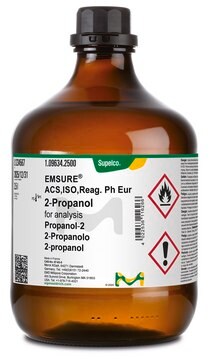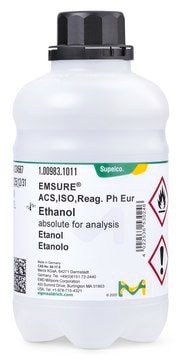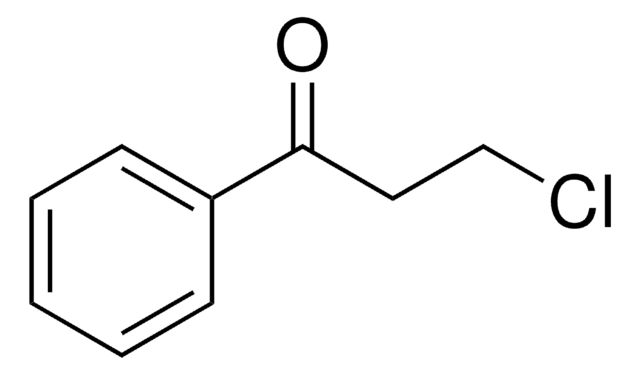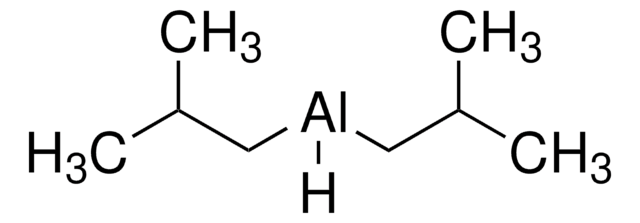1.07019
Toluene
for analysis EMPARTA® ACS
Synonym(s):
Toluol, Methylbenzene
About This Item
Recommended Products
grade
ACS reagent
Quality Level
vapor density
3.2 (vs air)
vapor pressure
22 mmHg ( 20 °C)
26 mmHg ( 25 °C)
product line
EMPARTA®
Assay
≥99.5% (GC)
form
liquid
autoignition temp.
997 °F
expl. lim.
7 %
impurities
≤0.0002 meq/g Acidity
≤0.0006 meq/g Alkalinity
≤0.003% Sulfur compounds (as S)
≤0.03% Water
evapn. residue
≤0.001%
color
APHA: ≤10
refractive index
n/D 1.496 (lit.)
kinematic viscosity
0.7 cSt(20 °C)
bp
110-111 °C (lit.)
mp
-93 °C (lit.)
transition temp
flash point 4 °C
density
0.865 g/mL at 25 °C (lit.)
storage temp.
2-30°C
SMILES string
Cc1ccccc1
InChI
1S/C7H8/c1-7-5-3-2-4-6-7/h2-6H,1H3
InChI key
YXFVVABEGXRONW-UHFFFAOYSA-N
Looking for similar products? Visit Product Comparison Guide
Application
- Experimental and Model-Based Approach to Evaluate Solvent Effects on the Solubility of the Pharmaceutical Artemisinin.: This research investigates the role of toluene as a solvent in enhancing the solubility of artemisinin, using both experimental setups and model-based assessments. The findings offer insights into solvent selection for pharmaceutical synthesis, making significant contributions to solvent theory and practical applications in drug formulation (Wünsche S et al., 2024).
- Highly sensitive and selective laser-based BTEX sensor for occupational and environmental monitoring.: Describes the development of a new laser-based sensor using toluene as a calibration standard for BTEX (Benzene, Toluene, Ethylbenzene, Xylene) detection. This sensor offers improved sensitivity and selectivity, crucial for monitoring air quality in occupational and environmental health contexts (Mhanna M et al., 2024).
- Response of microbial communities in aquifers with multiple organic solvent contamination: Implications for MNA remedy.: Explores the ecological impact of toluene and other solvents on microbial communities within aquifers. This study highlights the resilience and adaptability of microorganisms, informing strategies for monitored natural attenuation (MNA) in solvent-contaminated environments (Yang L et al., 2024).
- Elucidating solvent effects on lipase-catalyzed peroxyacid synthesis through activity-based kinetics and molecular dynamics.: Focuses on the use of toluene to understand its effects on enzyme-catalyzed reactions, specifically lipase-mediated peroxyacid synthesis. The study combines kinetic experiments with molecular dynamics simulations, enhancing the understanding of solvent interactions in biocatalysis (Brandolín SE et al., 2024).
- Stability-Indicating TLC-Densitometric and HPLC Methods for Simultaneous Determination of Teneligliptin and Pioglitazone in Pharmaceutical Dosage Forms with Eco-Friendly Assessment.: Utilizes toluene in the development of chromatographic methods for the analysis of pharmaceutical compounds. This research demonstrates toluene′s utility in creating efficient, eco-friendly analytical techniques for drug quantification (Akabari AH et al., 2024).
Packaging
Analysis Note
Identity (IR): conforms
Appearance: clear
Color: ≤ 10 Hazen
Acidity: ≤ 0.0002 meq/g
Alkalinity: ≤ 0.0006 meq/g
Boiling point: 109 - 111 °C
Sulfur compounds (as S): ≤ 0.003 %
Readily carbonizable substances: conforms
Evaporation residue: ≤ 0.001 %
Water: ≤ 0.03 %
Legal Information
Signal Word
Danger
Hazard Statements
Precautionary Statements
Hazard Classifications
Aquatic Chronic 3 - Asp. Tox. 1 - Flam. Liq. 2 - Repr. 2 - Skin Irrit. 2 - STOT RE 2 Inhalation - STOT SE 3
Target Organs
Central nervous system
Storage Class Code
3 - Flammable liquids
WGK
WGK 3
Flash Point(F)
39.9 °F - closed cup
Flash Point(C)
4.4 °C - closed cup
Certificates of Analysis (COA)
Search for Certificates of Analysis (COA) by entering the products Lot/Batch Number. Lot and Batch Numbers can be found on a product’s label following the words ‘Lot’ or ‘Batch’.
Already Own This Product?
Find documentation for the products that you have recently purchased in the Document Library.
Customers Also Viewed
Our team of scientists has experience in all areas of research including Life Science, Material Science, Chemical Synthesis, Chromatography, Analytical and many others.
Contact Technical Service







